
views
X
Research source
Learning Smart Strategies for Discipline

Be consistent. This may perhaps be the single most important thing to remember when disciplining a child. Your child can't learn the rules if the rules are always changing. Consistency is crucial both for getting your child to behave and for getting your child to learn which sorts of behaviors are acceptable and which aren't. Punishing a child inconsistently or allowing the child to weasel out of punishments teaches them that it's sometimes (or always) OK to behave badly.
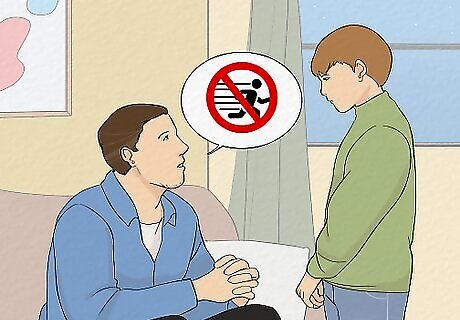
Use the same rules for punishing your child every time they misbehave. Your child needs to know and understand each of the rules, as well as the punishment they face for breaking the rules. Don't arbitrarily change your rules or change the punishments for certain behaviors without a clear reason for doing so. If your child repeatedly breaks the same rule, talk with them about why it's important to follow that rule. You could say, "We don't run in the house because it's easy to get hurt or break things." It also helps to provide them with a visual reminder of the rule, such as a sign with a picture depicting the rule.
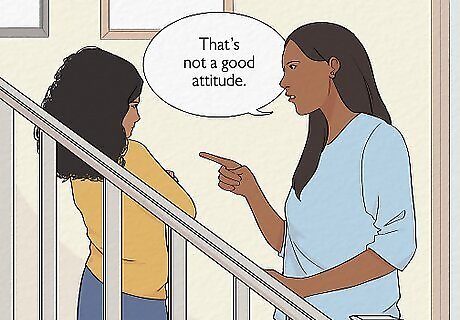
Acknowledge your child's poor behavior whenever it happens. Point out the behavior and remind your child of the rule. If necessary, assign a punishment. Don't ignore bad behavior when it's inconvenient to deal with. Remind your child of the behavior you want to see. You should also point out when your child is doing the right thing, offering praise. Say, "Great job picking up your toys today!"
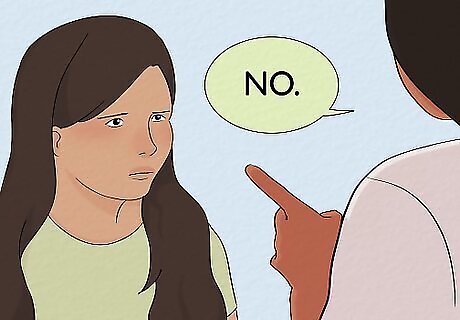
Assign a reasonable punishment from the get-go, then stick to it. Don't pick one punishment and then allow your child to get out of it or switch to an easier one. Don't let a child get out of their punishment with tears or puppy-dog eyes.
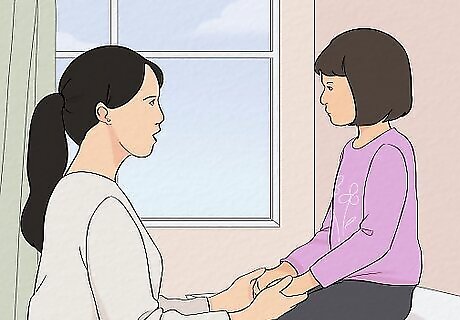
Set very clear boundaries. Your child will have a hard time avoiding bad behavior if they don't understand what bad behavior actually is. You should give your child a basic idea of what's wrong and what's right from as young of age as they are able to understand this distinction. The way to do this is by establishing clear boundaries, that is, making it clear to the child why and how a certain bad behavior is wrong, then punishing the child when the behavior is repeated (and, of course, by being consistent about these boundaries.) Obviously, your child/children's ability to understand the reasoning behind your boundaries will change greatly as they grow up. For instance, a toddler who's just learning how to speak won't understand not to draw on the walls with a marker if you lecture it about how harming other people's property is disrespectful. Instead, you'll have to suffice with a firm "no" and, if necessary, by taking their marker away.
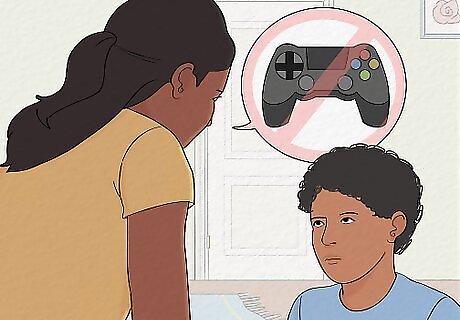
Fit the punishment to the crime. Different types of bad behavior demand different punishments. Small acts of disrespect or first-time infractions may deserve nothing more than a clear warning, while deliberate disrespect or violent behavior may require a serious response. Try to be reasonable about the punishments you assign, keeping in mind that children aren't perfect and learn by making mistakes but also that it's important to make sure they understand that their misbehavior is wrong and won't be tolerated. As an obvious example, grounding a child for a month is a little harsh if all they did was forget to bring home a paper from school for you to sign. A better punishment would be just to keep them from getting their allowance until they remember it. You'll also want to make your punishments age-appropriate; grounding a toddler won't do you much good. For a good guide to what sorts of punishments are appropriate for different age ranges, see Parents.com's punishment guide for children ages 1-10.
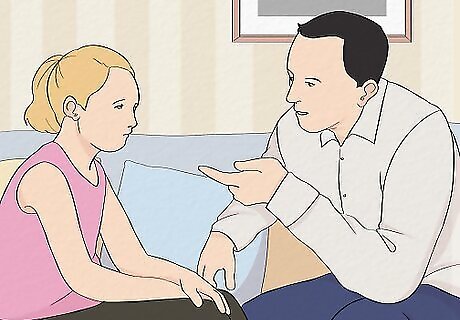
Be calm, but firm. Certain bad behaviors from your children may really get under your skin, but getting furiously angry with your child won't do you much good in the long run. Parents who can't control their anger will have a hard time making clear-headed, logical decisions about how to punish their child and may come to rely on emotional outbursts (or worse) as a way of getting their point across. In addition, getting in the habit of making your point with anger can set a bad precedent; if you get angry and yell at your child so often that it becomes a common occurrence, your anger may eventually lose its meaning, requiring you to get even angrier for your child to take notice. Thus, it's a wise idea to work on keeping your anger in check when your child is misbehaving. For example, if your child gets frustrated when playing catch and starts disrespecting you, don't lash out, instead, calmly tell them, "You know not to talk to me like that. We're done playing catch. You can get started on your homework." Keep your cool if they reacts to this with anger; you don't want to teach your child that they can easily drive you nuts. For more on this topic, see our How to Control Anger article or one of the many calm parenting guides on the web.

Present a united front with your partner. An old-fashioned piece of parenting advice that's still relevant today is to make sure to agree to form a united front with your partner when it comes to disciplining your child. This means that both parents must agree to the family's rules for discipline and follow them equally. Failure to follow this rule can lead to trouble; a family with one parent who's firm about punishments and another who's lax may encourage the child to run to the "easy" parent as soon as they've done something wrong. As a very general rule, the importance of a united front decreases as a child gets older. By their teenage years, most children will understand that parents can disagree about certain things without either of them being wrong.
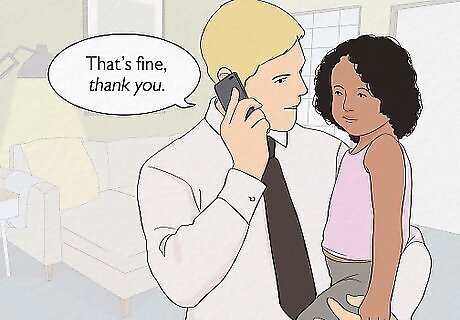
Be a positive role model. Always, always, always remember that your children learn from watching you. The things you tell your children to do aren't nearly as important as the things you show your children to do. Keep an eye on your own behavior when your kids are around. Make an effort to be a polite, happy, caring, hard-working, and productive person and your kids will notice. What you don't do is also very important. Don't do anything in front of your children you wouldn't want them to do in front of you. This includes throwing tantrums, acting immaturely, or giving into bad habits. For example, if you stress the importance of good manners to your children but spend every Wednesday night cursing and yelling at your elderly mother on the phone, you're sending the message that it's actually OK to have bad manners when someone's annoying to you.
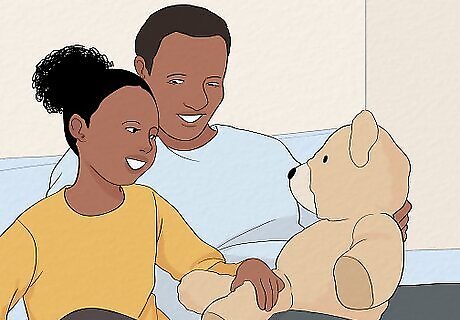
Don't forget to reward good behaviors. Punishment is only half of the battle. In addition to punishing bad behaviors, you'll also want to go out of your way to reward good behaviors like hard work, kindness, and patience. When your child is doing their job of being a kind, hard-working young person, encourage them to keep it up by showing them warmth and attention. Once they are used to receiving this sort of treatment in return for good behavior, withdrawing your affection when they misbehave can be a punishment on its own. Scientific research has shown that the power of positive reinforcement is not to be underestimated. In one study, positive parenting techniques corresponded with lower levels of antisocial behavior and substance abuse as the child aged.
Using Fair, Effective Punishments
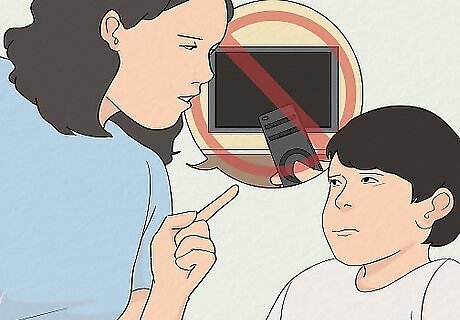
Withhold privileges. When it comes to precise definitions of which punishments are suitable and which aren't, parents' opinions differ; some parents opt for a strict approach, while others are more gentle. While there's no single right way to discipline a child, the suggestions in this section are intended as all-purpose tips that nearly all parents should find helpful. One example of a punishment that's suitable for all families is removing a misbehaving child's privileges. For instance, if a child's grades have been suffering because they haven't been doing their homework, you may want to restrict video game time to the weekends until they can show you a test with a grade of B+ or better. To be clear, you'll only want to take away a child's privileges as a form of punishment, not their basic needs. Temporarily keeping a child from seeing their friends or watching TV is one thing, but keeping a child from sleeping, feeling loved, or getting adequate nutrition constitutes child abuse.
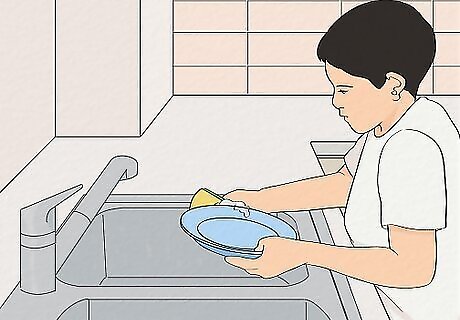
Use restitution (make the child pay you back). In the real world, there are consequences for breaking the rules; if a grown-up does something wrong, they will often be forced to pay back the people they wronged in the form of community service, paying a fine, and so on. Show your child the consequences for bad behavior by making them work to get things back to the way they were (or better) before they misbehaved. This is an especially useful tactic for when the child causes property damage. For instance, if your child deliberately paints on your kitchen table, a good punishment would be making them go through the process of stripping, sanding, and varnishing the wood to get it looking like new again.
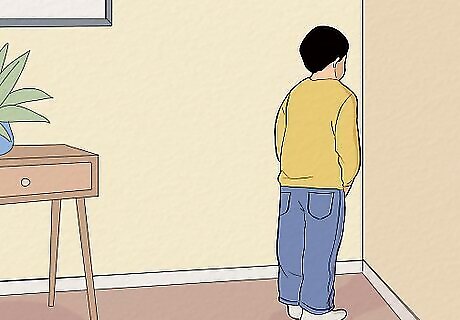
Use time-outs if your child responds well to them. Time-outs are somewhat controversial; to some, they're a weak, ineffective, coddling way to discipline a child, while others swear by them. While some parenting experts believe that time-outs aren't effective for all children, many believe that, when used correctly, time-outs can help an agitated child cool down and discourage bad behavior. Try experimenting with time-outs for minor infractions; if your child seems willing to behave after a quick time-out, they may be effective for you, but if he becomes more agitated or doesn't seem bothered by the punishment, you may want to use other tactics. The amount of time spent in time-out should vary based on the child's age and the seriousness of the misbehavior. A good general rule for minor misbehavior like back-talking, not listening, and so on is about one minute of time-out for each year of the child's age.
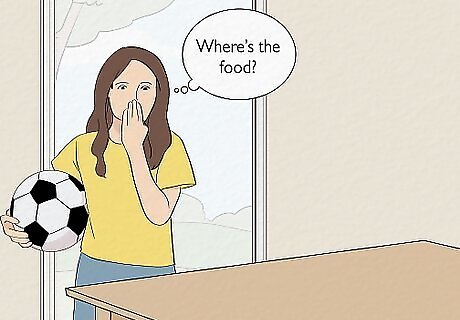
Use natural consequences. Adults can't afford to act shortsightedly or selfishly all the time. If a grown-up stays home from work to play video games, they may lose their job. Teach your children the importance of self-motivation by allowing them to suffer the natural consequences of their poor behavior. In other words, don't rescue them when they misbehave in a way that's against their own self-interest. For example, if a child won't stop playing to come eat dinner, just clean up the table when you're done with your meal and refuse to make more food afterward. This sort of approach helps children build the self-discipline that will help them succeed later in life.

Use grounding. As children age, they start to form important social connections with their peers and begin to spend their free time with these people. Temporarily cutting a child off from these enjoyable social relationships is one way to discourage bad behavior, especially if the grounding keeps the child from attending something they deem is important, like a birthday party or dance. Like time-outs, however, some experts believe that grounding can be ineffective for certain types of children, so use your best judgement and be willing to change your strategy if you're not getting results. Note that grounding should never be a permanent or semi-permanent condition. Keeping a child from forming mutually friendly relationships with others can affect their ability to function as adults and is usually considered a form of abuse.
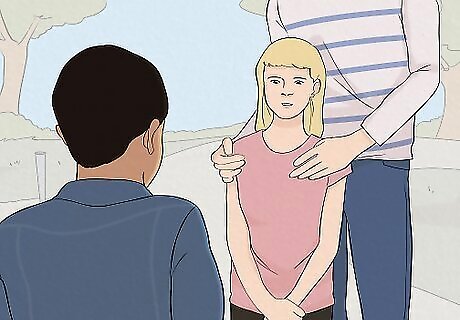
Force the child to apologize for major misdeeds in person. Though it's often overlooked, the power of a heartfelt, personal apology can be huge. For example, if your child tears up the neighbor's yard, playing tag with their friends, making them come over to the neighbor's house and apologize is a great punishment. For added effect, you may also want to make them spend the next Saturday helping to get the yard looking good again. Making a child apologize to someone they've wronged face-to-face doesn't just force them to go through an unpleasant experience as a form of punishment, it also prepares them for an adult life in which they'll need to apologize for their mistakes to maintain healthy relationships. An in-person apology is also a very humbling, diminishing experience for a child to go through, which can help with out-of-control egos. If your child is older, teach them to write apology letters explaining why their bad behavior was wrong and expressing remorse.
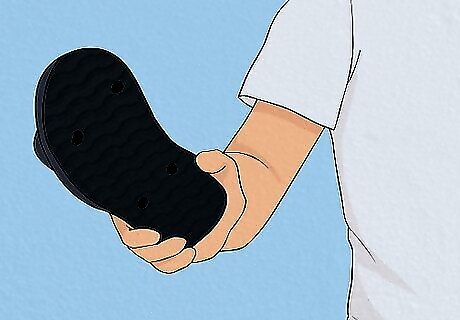
Use safe, mild corporal punishments sparingly (if at all). Perhaps no topic in child discipline is more controversial than the use of corporal (physical) punishment. Some parents make a point of never raising a hand against their child, while, for more old-fashioned parents, spankings, paddlings, and even open-handed slaps for especially bad misbehavior are acceptable. If you do decide to use corporal punishment, reserve it for the most serious offenses. Relying on it too heavily can dull its effectiveness and, worse, teach children that it's acceptable to hurt people less powerful than them. While it's every parent's job to decide the best way to discipline their own child, there is some evidence to suggest that relying too heavily on corporal punishment is a bad idea. For instance, some research associates corporal punishment in children with delinquency in adolescence and even violent behavior and emotional dysfunction in adulthood.
Avoiding Harmful Punishments
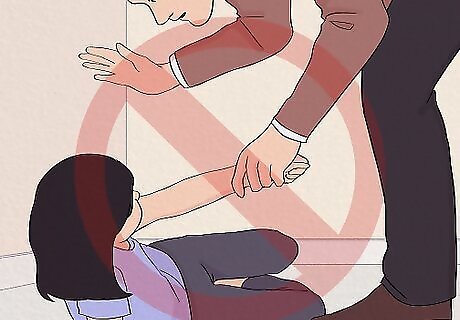
Don't ever beat a child. Even parents who practice corporal punishment usually make a clear distinction between the occasional spanking and a deliberate, violent beating. It's never OK to beat a child. This is almost universally recognized as a form of abuse by parenting associations. In addition, clear links have been established between suffering beatings as a child and increased rates of mental illness as an adult. Additionally, certain forms of violence can cause permanent, even lethal damage to a growing child. For instance, shaking a young child in frustration or anger can give them brain damage or kill them.
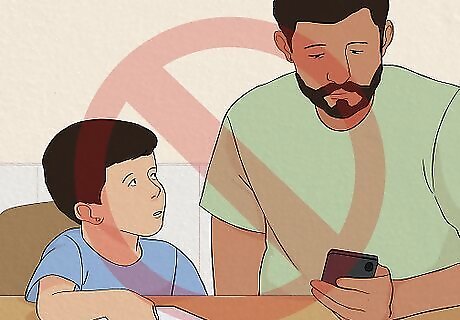
Don't be an emotional abuser. It's perfectly possible to be an abusive parent without even raising a finger towards your child. Neglect, isolation, and intimidation are all ways to damage your child's emotional growth. Though raising a child can be frustrating, these behaviors are never okay; not only are they cruel and unfair to the child, but they can also lead to serious problems, including self-harm, substance abuse, depression, and even suicide. Below is a brief list of behaviors that qualify as emotional abuse. For a complete list, consult anti-abuse resources like the American Humane Association: Isolating the child from others from normal social interactions. Verbally assaulting the child with insults, threats, and ridicule. Terrorizing the child for failing to meet unreasonable expectations. Deliberately humiliating a child. Using fear and intimidation to control a child. Ignoring or neglecting the child's basic needs. Forcing the child to do something wrong or unhealthy. Refusing to show your child love, tenderness, and affection.

Don't punish a child's curiosity. Children are naturally curious; they learn by interacting with the world around them. Try to avoid punishing your child for misbehavior that's a result of honest curiosity. Punishing a child for doing something that they didn't even know was wrong may encourage them to be afraid of new experiences in the long run or even make the bad behavior more exciting. For example, it would be wrong to punish a child for asking their friends about sex, a better idea is to sit down with them, answer their questions, and explain why it's a bad idea to talk about sexually explicit things in public. Admonishing them without an explanation will probably just make them more curious.
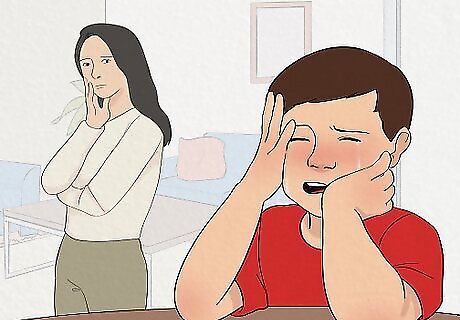
Know the dangers of harsh, overly-strict parenting. It's easy to go too far in your quest to discipline your child, but this is something you should always strive to avoid. Holding your child to unrealistic standards and assigning excessively strict punishments can affect their ability to live a happy, healthy life. Always remember that your goal as a parent is to help your child get to the point where they can basically parent themselves, not bully the child into living life exactly as you want them to. It's also important to note that overly harsh parenting techniques are often ineffective because they deprive the child of the chance to become self-disciplined. If a child is constantly reacting to the punishments and demands of an excessively strict parent, they never learns how to motivate themselves.
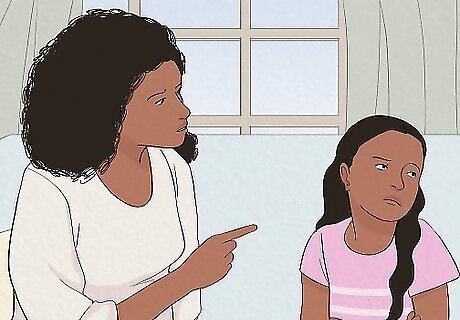
Know the dangers of weak, permissive parenting. On the other hand, it's equally easy (if not even easier) to go to far in the opposite direction. Refusing to follow through with punishments and letting your child walk all over you teaches them that they don't need to behave well or work hard to get what they want. Making a habit of caving to a fussy child or repeatedly rescuing them from unpleasantness can also ruin their ability to deal with negative emotions in a mature way. In a word, this creates a child who is spoiled. If you struggle to be strict, ask your co-parent or an adult you trust to help you stay firm and accountable to your child's behavior plan. You may feel more comfortable enforcing the rules or punishments if you explain to your child the reasoning behind them and importance of follow through. Say, "I know you're upset that I won't go back to Granny's house to get your toy, but you should have put it back in your bag when I told you to. It's important that you listen to Mommy." Again, this sort of parenting actually does your child a disservice in the long run. Most parenting experts agree that raising a child with an overly permissive style can lead to an adult who has a hard time getting satisfaction from their life and having a positive self-image.
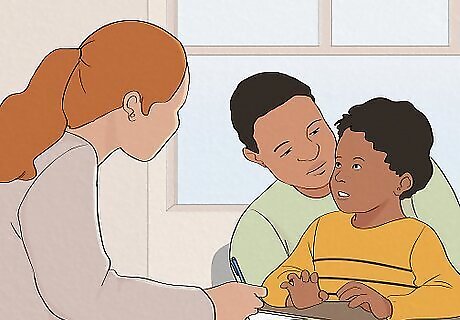
Get outside help for major behavioral issues. Unfortunately, some behavioral issues are beyond the scope of normal parenting techniques and may require professional help. These problems can't (and shouldn't) be treated with normal punishment and discipline techniques. They may require medicinal solutions, counseling, or mentorship that an ordinary parent can't provide. Below is just a short list of problem behaviors that require the attention of a professional: Crime (shoplifting, vandalism, violence, etc.) Substance abuse Other addictions (internet, sex, etc.) Mental/emotional illnesses (learning disorders, depression, etc.) Dangerous behavior (risk-seeking, street racing, etc.) Rage or violent outbursts



















Comments
0 comment